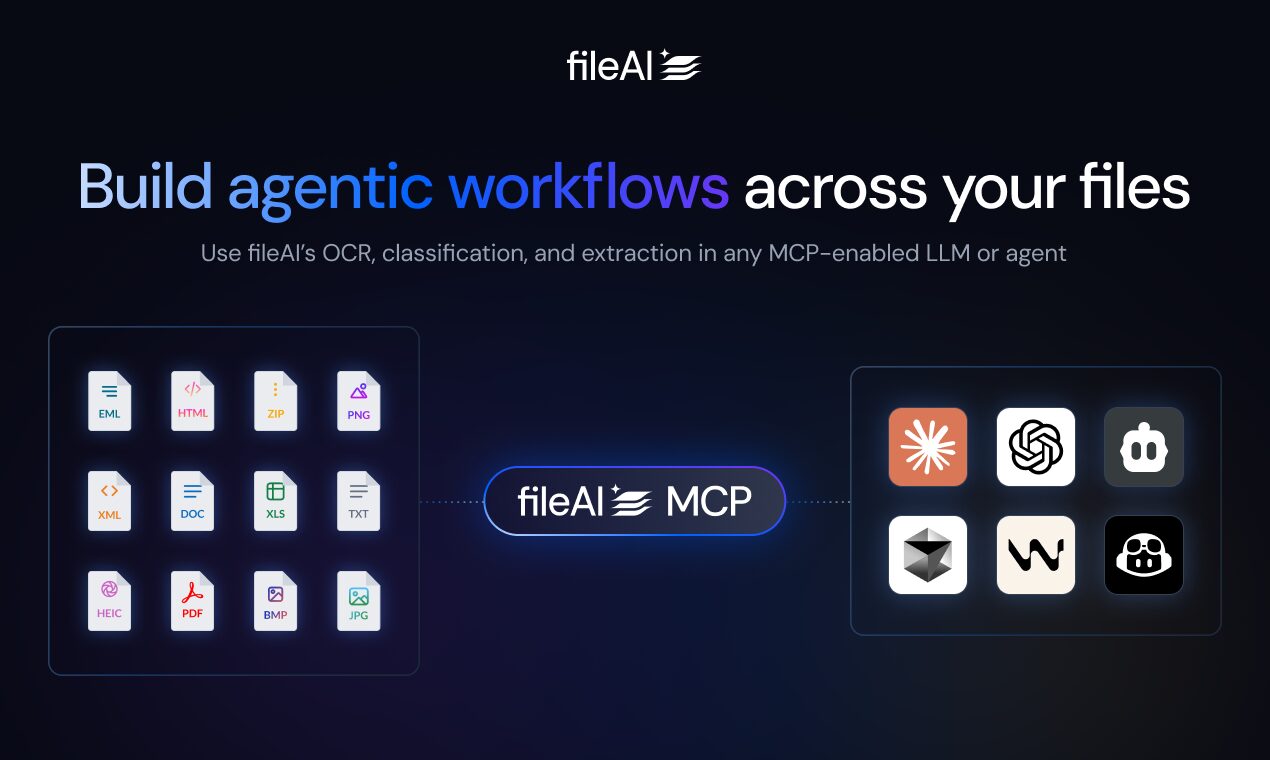Table of Contents
Overview
In today’s data-driven world, transforming raw files into actionable intelligence is crucial for AI agents. The fileAI MCP server is an innovative tool designed to turn your files into usable data instantly. This solution provides AI agents with secure access to your documents through advanced AI OCR, intelligent classification, and schema-based extraction—all facilitated through the Model Context Protocol. It empowers AI agents with the contextual data they need to perform effectively.
Key Features
The fileAI MCP server offers comprehensive capabilities designed to streamline AI workflows and enhance data processing.
- AI OCR for file processing: Advanced AI OCR technology reads and processes various file types, transforming unstructured data into structured formats suitable for AI agents.
- Intelligent document classification: Automatically categorizes documents using machine learning, ensuring organized and easily retrievable data for improved efficiency and searchability.
- Schema-based field extraction: Extracts specific data points from documents based on predefined schemas, providing consistent data output tailored to specific requirements for downstream processes.
- Secure access via Model Context Protocol: Provides a secure channel for AI agents to access file data while maintaining data integrity and compliance through the Model Context Protocol (MCP).
- Multi-step prompts and agentic workflows: Enables AI agents to execute complex, multi-stage tasks by providing necessary file context, facilitating sophisticated autonomous workflows.
How It Works
Getting started with fileAI MCP integrates seamlessly into existing AI ecosystems to unlock new automation levels.
First, install the fileAI MCP server within your environment. Once operational, AI agents securely connect via the Model Context Protocol. Through this connection, agents utilize integrated AI OCR to efficiently read and interpret various file types. The system then intelligently classifies content and extracts specific data points based on predefined schemas. This structured data powers multi-step prompts, enabling the design and automation of complex workflows, such as generating detailed validation reports or other data-intensive tasks.
Use Cases
The versatility of fileAI MCP makes it valuable across various applications, significantly enhancing AI agent capabilities.
- Automating document workflows: Streamline document-centric tasks, accelerating business processes by allowing AI agents to handle document intake, processing, and routing.
- Secure file data extraction: Extract information from various documents for validation and compliance reports while maintaining data integrity and reducing manual errors.
- Enhancing AI capabilities with file context: Provide AI models with rich file context, enabling more informed decisions and complex analyses for intelligent outcomes.
- Processing unstructured files: Transform unstructured data from various file types into clean, organized, structured data ready for database integration or further AI processing.
- Building agentic workflows: Develop sophisticated, autonomous AI agent workflows that handle complex, multi-stage operations with minimal human intervention.
Pros \& Cons
Understanding the advantages and considerations of fileAI MCP helps determine if it fits your needs.
Advantages
- Enables secure AI access to files: Ensures data privacy and security when AI agents interact with sensitive documents, crucial for compliance and trust.
- Advanced OCR and extraction: Delivers precision in converting images to text and extracting specific data fields, minimizing errors and improving data quality.
- Universal protocol for integration: Simplifies connection and communication between various AI agents and the file server, fostering a cohesive AI environment.
- Automates complex workflows: Streamlines multi-step processes, reducing manual effort and potential errors in document-based tasks.
- Improves AI agent capabilities: Empowers AI agents with crucial file context, significantly enhancing their decision-making and task execution abilities.
Disadvantages
- Requires server setup: Involves initial installation and configuration, which may require technical expertise and IT resources.
- Technical knowledge needed for advanced features: Optimizing schema-based extraction and designing complex agentic workflows may require specialized technical skills.
- Limited scalability information: Specific performance details under high loads or large-scale enterprise deployments are not readily available.
How Does It Compare?
When evaluating fileAI MCP against other solutions in 2025, its unique value proposition becomes clear in the evolving intelligent document processing landscape.
Modern AI Document Processing Leaders:
- Graip.AI offers self-learning AI with 82% accuracy out-of-the-box (vs Microsoft’s 53%), template-free processing across 140 languages, and active learning that improves over time
- Nanonets provides API-first architecture with custom model training, strong developer tools, and cost-effective processing starting at \$0.3 per page
- Hyperscience features proprietary machine learning that continuously improves with use, modern UI, and human-in-the-loop validation
- UiPath Document Understanding integrates seamlessly with RPA workflows, offers no-code configuration, and provides robust automation capabilities
Cloud-Native OCR Solutions:
- Amazon Textract delivers template-free extraction with strong AWS integration, pay-per-use pricing, and excellent scalability for AWS-centric organizations
- Google Cloud Document AI provides advanced document understanding, multi-language support, and enterprise-grade processing with structured data output
- Microsoft Azure Document Intelligence offers pre-built models, custom training capabilities, and comprehensive Azure ecosystem integration
fileAI MCP’s Distinctive Position:
fileAI MCP differentiates itself through its Model Context Protocol integration, specifically designed for AI agent workflows. While the above solutions excel in document processing accuracy and enterprise features, fileAI MCP focuses on secure, agent-to-agent communication and contextual data delivery for autonomous AI systems. This makes it particularly valuable for organizations building sophisticated AI agent ecosystems that require seamless, secure access to processed document data rather than just document processing capabilities alone.
The key distinction lies not just in document processing accuracy, but in how processed data integrates with AI agent workflows through the standardized MCP protocol, enabling more sophisticated automation scenarios.
Final Thoughts
The fileAI MCP server offers a focused approach to AI agent integration with file-based data processing. By providing secure access, AI OCR capabilities, schema-based extraction, and the ability to power agentic workflows through MCP integration, it addresses specific needs in the AI agent ecosystem. While it requires initial server setup and technical expertise for advanced configurations, the benefits of enhanced security, contextual data delivery, and automation for AI agents are valuable. For organizations building AI agent systems that need structured, actionable intelligence from files, fileAI MCP provides a specialized advantage in the agent-centric automation space.
